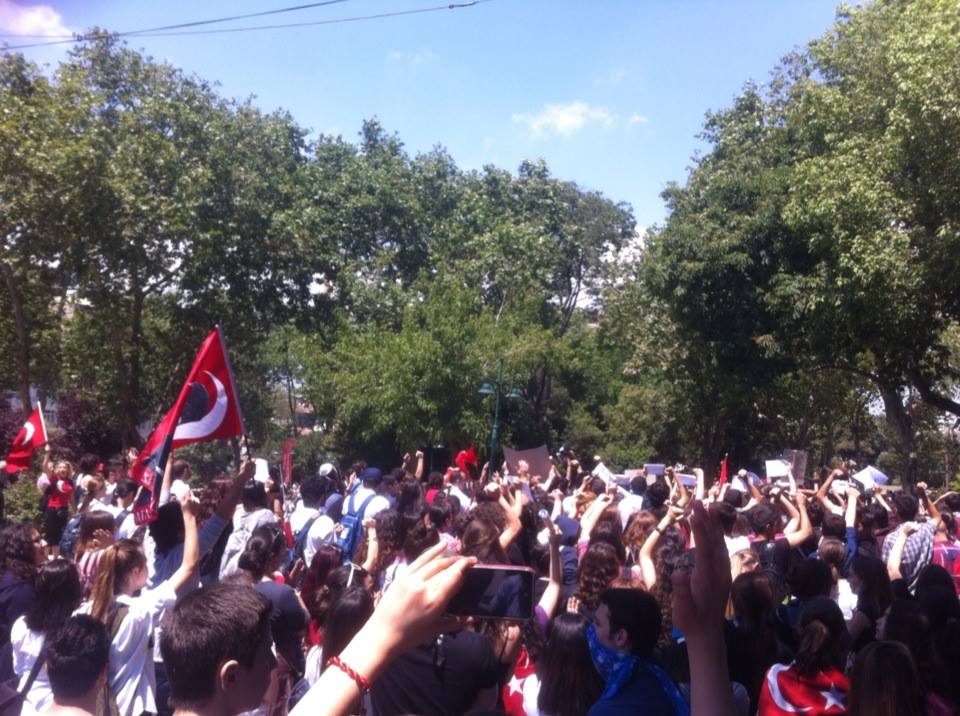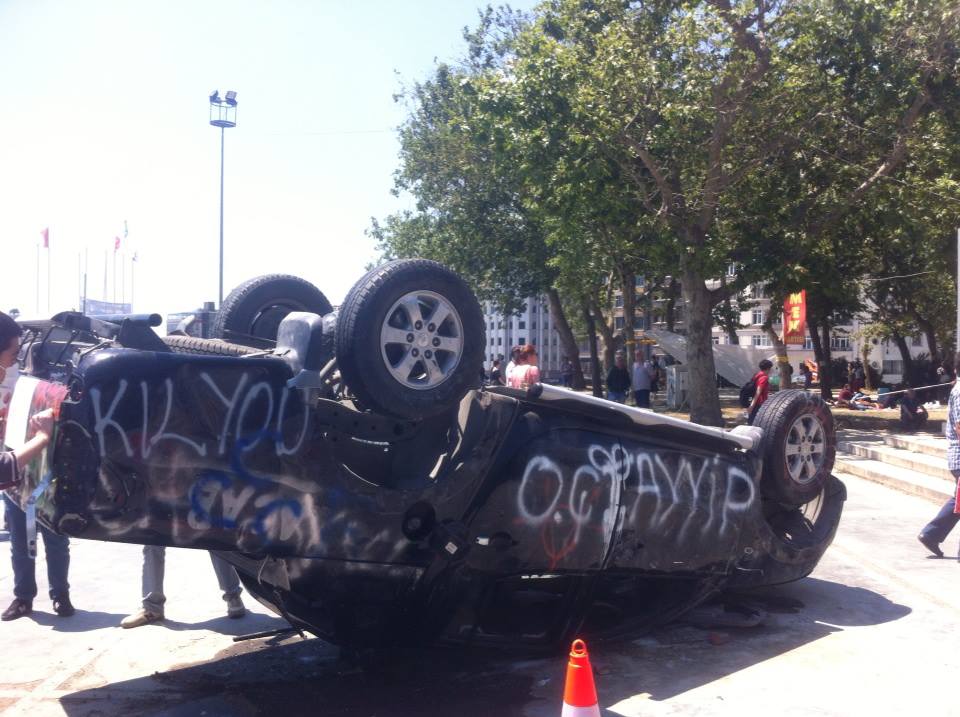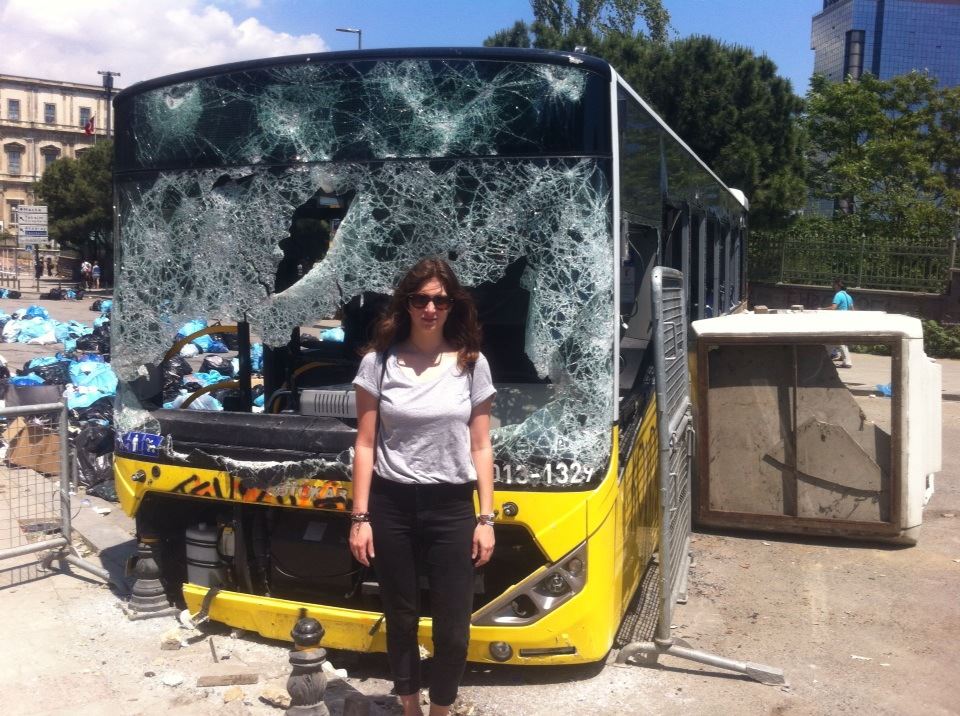
The riots that have electrified the city of Istanbul for four days now continue to endure, despite heavy police retaliation. What began as a peaceful protest to prevent the redevelopment of Gezi park in Taksim Square has now escalated into a nation-wide demonstration against the current Government.
Recep Tayyip Erdoğan has been repeatedly criticised for his dogmatic influence over the country based on grassroots Islamic ideals, and his latest staunch refusal to listen to protesters has ignited anger even among those who had voted him into his third term as Prime Minister. In his address to the country on the 2nd June he referred to the protesters as “terrorists” and has been quoted as saying “every four years we hold elections and this nation makes its choice”. Despite the democratic election Erdoğan seems to have forgotten that a democracy constitutes the decisions of several members of a party, yet it is shockingly clear that Erdoğan holds the majority of the power, and indeed earns more than any other politician in the world at $989,000 a month, although Wikileaks claims that his earnings may be far higher. It would not be a far stretch of the imagination to envisage Erdoğan as the next Putin and Turkish President Abdullah Gül serving as Medvedev, however in stark opposition to the Prime Minister, Gül has defended the people’s right to protest stating: “democracy does not mean elections alone. There can be nothing more natural for the expression of various views, various situations and objections through a variety of ways, besides elections.”
Despite Gül calling for a peaceful end to the violence and a more mature handling of the situation, suggestive of mishandling on both sides, Erdoğan has continued to belittle the extent of the riots claiming that he would not ask permission for the redevelopment plans from “a few looters”. It has emerged that the destruction of Gezi Park is not only to free up valuable real estate for a shopping mall, but also includes the construction of a Mosque, a symbolic representation of Neo-Ottomanism and Turkey’s new incentive under the Justice and Development Party to engage with areas previously under Ottoman rule in the Middle East.
Although the riots are being referred to as the ‘Turkish Spring’ in reference to the ‘Arab Spring’ uprisings of 2010, this would be a false representation. The events in Turkey are more an uprising against fascism than an Imperialist fueled uprising against Islam, which in such countries as Egypt were conducted by armed extremist groups. The protests in Istanbul began as a reaction against heavy handed police retaliation in Gezi Park, where peaceful environmental protesters were viciously attacked in their tents during a dawn raid. The nature of the events has magnified into a nationwide protest against an increasingly authoritarian government, with anti-government demonstrations appearing across Turkey including Erdoğan’s hometown Rize.
With cries rising from the crowd of ‘shoulder to shoulder against fascism’ the riots are not as complicated as Erdoğan has suggested. In an address on 3rd June he encouraged the view that the riots have a politically subversive agenda, stating “citizens should not be part of this ‘game’”; a ‘game’ that alleges the opposition party, the People’s Republican Party, are involved in actuating the riots for their own gain.The demonstrations, however, are obviously not instigated by a few extremist “marginalized groups” as Erdoğan has stated; it is the result of a highly pressurised problem that has finally discovered a fissure out of which to escape. A large part of the population are fearful of being forcibly dragged into a theocratic state run by a “Sunni Islamist tyrant”, as one source expressed. As proudly stated by the men on the streets as well as by Erdoğan himself, albeit with different intent; “this is no longer about trees, it is about ideology”.
As the fourth night of the demonstrations descend on the city, Taksim Square remains occupied and the streets are a cacophony of clanging pots and pans and car horns which can be heard from the other side of the Bosphorus. Despite heavy police intervention including tear gas canisters and high pressure water jets fired directly at the crowd just a day before, people are still resisting against what is being called a Dictatorship. Although Erdoğan conceded that “there have been some mistakes, extremism in police response” he also insisted that “the police were there yesterday, they are there today, and they will be there tomorrow.”
Human rights have increasingly come under question on both an Ideological level and on the streets, with police firing tear gas directly into the crowd instead of at the designated 45 degree angle required by international law, hundreds have been injured and 4 confirmed dead. Among those dead is Andaç Güzel, who died of a heart attack induced by the excessive use of tear gas. Although Interior Minister Muammer Guler said that an official investigation would be launched into the allegations of disproportionate force, as the city continues to rage the police presence remains tangible and aggressive.
The aggravated situation has been in part caused by the AKP (the ruling Justice and Development party of which Erdoğan is the chairman) passıng laws that express the deeply Islamic roots of the party, such as condemning public affection and banning alcohol sales from 10pm to 6am, which many liberal Turks believe to be infringements of their human rights and a drastic step away from the secular society propagated by Kemal Atatürk ninety years ago. Indeed, Erdoğan has been recognized as the most powerful Turkish political figure since Ataturk, and has recently been quoted as calling all those who drink ‘alcoholics’ and Atatürk himself a “söt” or ‘drunkard’, much to the astonishment of the public.
The riots also express deeper discontent, one that includes the infringement of the right to freedom of the press, with the censorship of the media brought into effect under a loosely interpreted anti-terrorism law. CNN Turk did not begin to extensively cover the riots to the degree the situation demanded until the third day, and only after international media outlets had broadcasted to the rest of the world. Social Media sites have played a crucial role in this last weeks events, with Facebook groups such as Occupy Istanbul regularly posting updates and messages to its 28,000 followers, and the hacker group Anonymous entering the fray. One of the only Turkish television stations broadcasting the events was Halk, an independent news station that does not fear the long arm of the government to the same extent as the larger stations. Turkey now has a total of 74 journalists in jail, more than any other country in Europe, without freedom of the press it is arguable as to whether democracy is possible at all.
It seems that Turkey’s international image as a modern democracy is beginning to crumble under the severity of these events and their catastrophic mishandling. As of midnight on the 2nd June Erdoğan left the country for a planned trip to Morocco amid calls for his government to step down and 3000 people protesting outside his gates, with thousands more building a wall of debris between themselves and the police, who continue to fire tear gas into the crowds.
Words: Alexandra Embiricos



